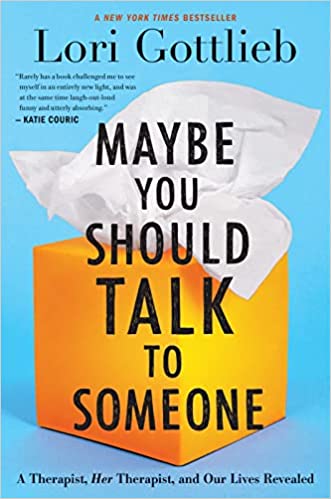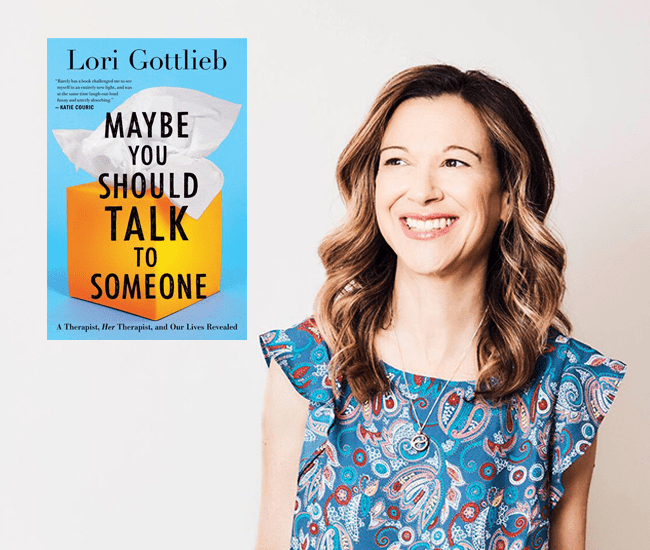Maybe You Should Talk To Someone by Lori Gottlieb
Psychotherapist Lori Gottlieb has always helped patients and provided a safe space in her Los Angeles practice. When she experiences a major crisis in her own life, she decides to seek help of her own.
In Maybe You Should Talk to Someone (Houghton Mifflin Harcourt), Gottlieb explores the inner chambers of her patients’ lives and finds that the questions they are struggling with are the very ones she is now bringing to her own therapist, Wendell.
Maybe You Should Take to Someone provides a behind-the-door peek in Gottlieb’s therapy sessions – as both therapist and patient. She has a wonderful gift of connecting the reader to her characters through language and humor. She describes one of her client’s crying as “not breaking down but breaking open.”
Readers become invested in everyone’s personal stories: John was having marriage problems and suffered a devastating loss, and Julie was having trouble starting a family and then was facing her imminent death. You feel compassion through the pages and can tell how breakthroughs deepen relationships and trust, and nourish and feed Lori, providing her own self-awareness and validation.
Gottlieb allows us to feel deeply and freely, laughing and crying as we take a therapeutic ride with her and people just like us, as they journey to a higher level of self-awareness and understanding.
We had a chance to probe deeper into the author’s life and work.
You describe a problem in your book where you were sad and upset and there was an overall feeling of tragedy. Yet your book is full of humor. Were things funny in real-time or did you add the humorous moments when you were writing?
Life is inherently comic and tragic, sometimes at the same time. One way we manage pain is by seeing the humor in the ridiculousness of the human condition. I mean, we’re all ridiculous at times even though our pain is very real. So the humor was inherent to the narrative. I didn’t need to add anything.
Did going through what you went through help you become a better therapist?
I think that seeing Wendell made me a better therapist. As his patient, I got to see a therapist who brought his personality into the room, who was so unselfconscious and authentic while also holding appropriate boundaries.
In graduate school, we’re taught to be careful in many ways, and sometimes that layer of training gets in the way of being human in the room, of creating a deep, rich experience that ultimately helps the patient most. I wouldn’t be the therapist I am today had I not had that modeled for me by my own therapist.
One thing that struck me was the revelation that therapists mourn alone due to privacy concerns. Did Julie’s husband recognize you at the celebration of her life, or did you attend unnoticed?
He knew who I was because I saw Julie at their house for the last few sessions when she was too sick to come into the office. So I met him then. But I was very much anonymous, by design, at her funeral to protect her privacy.
You describe therapy as a relationship between patient and therapist rather than one-sided. When you told Wendell he wasn’t a man (meaning you didn’t see him that way, you saw him as a therapist), did you realize that is how others may see you? Is it difficult for you to be stripped of your feminine self and seen as a therapist rather than a woman?
I’m still my feminine self in the therapy room – I’m me, in all of the ways I present in the world. That’s the point he was making. We’re not robots, we’re human beings. And patients respond to us the way they respond to people in the world.
I cried so many times while reading your book – you knew exactly how to get to my emotions. Why do you think that is the case?
I think the book resonated so widely because it’s real-life – not the social media version of life, but just life. And that’s so relatable. Readers are deeply invested in these people because they see parts of themselves in each person I write about. They’re invested in both their hardships and their triumphs. Readers become very attached to these patients, just as I did as their therapist.
I hear your book is going to be dramatized on TV. Can you share any details?
The TV version is both comedic and dramatic, like the book. Therapists have been portrayed in all kinds of unrealistic ways on TV, so I hope this show helps to change that. It’s about a woman who happens to be a therapist, versus a show about a therapist. And I think that distinction makes all the difference.
Maybe You Should Talk to Someone is now available.
Buy this Book!
Amazon




